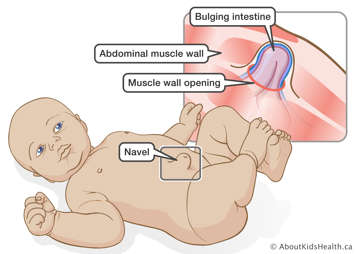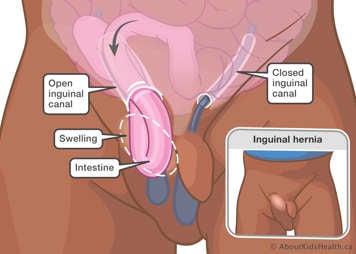What is a hernia?
A hernia happens when tissue, fat or bowel pushes through an opening in the abdominal wall or through the inguinal canal. The inguinal canal is the passage through which the testes descend into the scrotum. When your child has a hernia, you can usually see a swelling or a bump under the skin. This bump may get bigger after your child cries or strains. The bump often gets smaller during the night, while your child is asleep or relaxed.
There are different types of hernia:
- An umbilical hernia happens at or near the belly button. Usually, an umbilical hernia does not cause any serious problems. Most umbilical hernias in infants will resolve without any intervention, so your child does not need to be seen by a surgeon unless there are concerns the hernia is causing symptoms or persists after three to four years of age. It is common that your child’s umbilical hernia will look larger when they are crying or straining to stool. As long as it remains soft and non-painful once they relax, this is normal.
- An inguinal hernia happens near the groin area, between the belly and the thigh. In children with male anatomy, you can often see a swelling in the scrotum. Inguinal hernias can be direct (going through weakened abdominal muscles) or indirect (through the inguinal canal). Indirect hernias are the most common type of inguinal hernias If an inguinal hernia is not treated, it can cause serious problems.
- An epigastric hernia happens in the middle of the abdomen between the breastbone and the belly button.
Your child may need surgery (an operation) to fix the hernia. A urologist or a general surgeon will operate on your child.
Use this information to explain to your child what will happen, using words they can understand.


When to seek medical care for a hernia
Most hernias can easily be pushed back in and slide back and forth easily – these are called reducible hernias. These typically do not cause your child any pain or discomfort. You can get referred to a paediatric surgeon by your primary health-care provider for assessment and if the surgeon decides surgery is needed, this will be planned as an elective procedure.
However, hernias can become a problem if tissue or bowel gets stuck in the hernia and the contents can’t easily be pushed back in – these are non-reducible incarcerated hernias. Symptoms that arise from this may be a painful bulge, decreased appetite or oral intake of feeds, nausea and/or vomiting, difficulty passing gas or stool, and colour change over the bulge. If your child has these symptoms, please go to your nearest emergency department immediately so that a health-care provider can reduce the hernia.
If the hernia is successfully reduced, you will be booked for a follow-up with a paediatric surgeon for assessment and discussion of potential surgical repair, which will also be planned as an elective procedure.
If the hernia cannot be reduced or there are signs of damage to the stuck tissue, an urgent surgery will be done.
Surgical repair of hernias
Hernias are typically diagnosed with a thorough history and physical examination. Imaging studies are not routinely done unless the surgeon believes it is necessary.
The repair of hernias depends on the type of hernia and whether they cause issues for your child:
- Umbilical hernias: These typically resolve on their own by five years of age. If the umbilical hernia continues past this age, or is causing your child symptoms, a surgeon will assess and may recommend an umbilical hernia repair.
- Inguinal hernias: These typically do not resolve on their own. After a surgeon has assessed your child, open inguinal hernia repair or laparoscopic hernia repair may be offered. The type of surgery depends on the surgeon and on whether your child has a one-sided hernia or a hernia on both sides.
- Epigastric hernia: Epigastric hernias do not involve intra-abdominal contents and therefore only need to be repaired if they are causing symptoms (typically pain with particular movements).
- Any hernia with recurrent episodes of incarceration (non-reducible hernias): Your surgeon may decide to offer repair earlier if there are multiple visits to the emergency department for reduction.
The repair involves making one to three small incisions to access the hernia, gently pushing the protruding tissue or bowel back into the abdomen and then closing the hole with stitches. The surgeon will not need to implant a mesh in most circumstances. Surgery takes approximately 30 to 60 minutes. The child usually returns to normal activities within one to three days.
Preparing for a surgical hernia repair
Before a surgical repair, consent will be obtained with the surgeon. A nurse will then discuss important details with you and your child that are needed before the procedure including fasting, pre-operative blood work and any other procedure-specific details.
At the hospital
Usually, a hernia repair is a day surgery. This means that your child can go home on the same day as the operation. Sometimes, your surgical team may decide that your child needs to stay overnight following the operation. This is usually for children who are less than 50 weeks old (corrected gestational age) or have a complex medical history that requires monitoring. You can bring items that your child feels comfortable with, such as their favourite toy, toiletries and additional clothing.
You will need to take time off from work
Unless there are problems after the operation, your child will go home on the same day as the operation. You will need to take at least one day off from work for the day of the operation.
Usually, children recover quickly after having a hernia repair. They may have to be home from school or daycare for several days to rest. They can return to normal activity as soon as they feel well enough. They can go swimming after two weeks if the incisions are healing well.
Caring for your child at home after the operation
Care of the incision
Your child will have stitches or skin adhesive to close the incision (surgical cut). The stitches will be covered with either a small dressing or small pieces of tape, called steri-strips. If skin adhesive is used, it will loosen and come off on its own.
- The stitches will dissolve in several days.
- Within 48 hours, your child can give a sponge bath. Use non-scented soap and gently clean the area daily. You can soak the dressing off in the bathtub after 14 days (if it has not come off on its own).
- Steri-strips will fall off on their own. If they have not fallen off 7 to 10 days after the operation, you can take them off.
- Skin adhesive will slowly loosen and come off on its own five to 10 days after the operation.
Always wash your hands before you touch or clean the incision area.
A small amount of blood staining the steri-strips is normal, as long as the blood is dry and not spreading. If it looks fresh (bright red) or it is spreading:
- Press on the area with a clean washcloth for five to six minutes.
- If the bleeding does not stop, call your child's surgeon's office or take your child to their health-care provider.
Pain
Your child will feel sore for two or three days. You can give your child acetaminophen or ibuprofen as needed to relieve the pain. The surgical team will explain when you can use these medicines.
If the pain gets worse, even after your child takes pain medicine, call the surgeon's office.
Food and drink
For the first 24 hours after the operation, your child may have nausea (feel sick to their stomach) or vomit (throw up). This is normal. Give your child clear liquids to drink after the operation, like water and apple juice. As soon as your child is feeling better, they can go back to eating what they normally eat.
If your child cannot eat what they normally eat at home, call the surgeon's office.
Bathing
Your child can shower, starting 48 hours (two days) after the operation. Avoid swimming or submerging in bathtubs for two weeks, unless your surgical team tells you otherwise.
Activity
Your child will be able to sit up, crawl or walk within a few hours after the operation.
At home, your child should rest for one or two days. After that, they can gradually go back to their normal activities at their own pace.
Depending on how your child feels, they should not do heavy lifting, participate in contact sports, ride a bicycle or play with toys that must be straddled for two to four weeks.
Going back to day care or school
Your child can go back to day care or school as soon as they feel well enough.
What to expect in the future
A hernia repair is a common procedure. There are usually no long-term problems. Possible problems are:
- the wound getting infected
- the hernia coming back
When to call the surgeon
The main concern with a hernia repair is infection. Call your child's surgeon's office right away if your child has any of these signs :
- fever above 38°C or 100.4°F that continues for two or more days
- thick, yellow or green, foul-smelling leakage from the wound
- active bleeding
If the symptoms are worsening and not improving or you are worried, do not wait to get in touch with the surgeon. Take your child to their health-care provider or the emergency department right away.
Some painless scrotal swelling is normal, but if you notice a re-occurrence of the hernia, notify your child’s surgeon and go to your nearest health-care provider or emergency department to have your child evaluated.
At SickKids
If you have concerns at night or on the weekend, you can visit your local Emergency Department or the Hospital for Sick Children Emergency Department. If you have any questions, you may also contact your child’s health-care provider.
Urology
Urology clinic: 416-813-6661
General Surgery
General Surgery clinic: 416-813-7272.